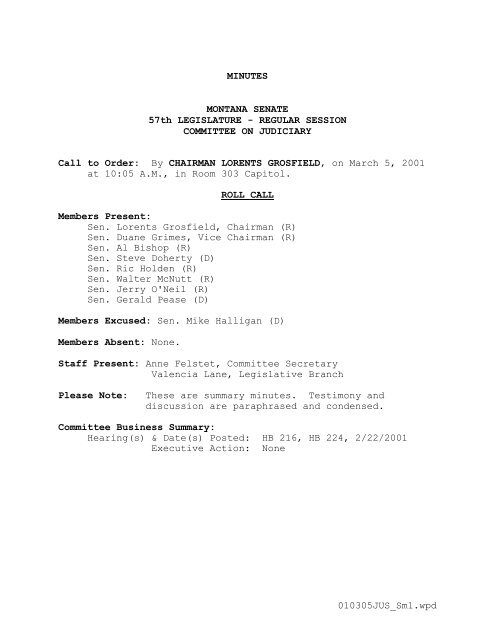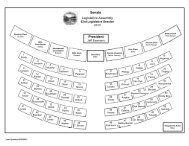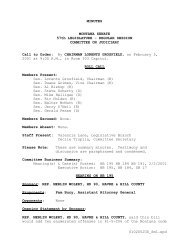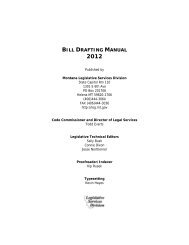010305JUS_Sm1.wpd MINUTES MONTANA SENATE 57th ...
010305JUS_Sm1.wpd MINUTES MONTANA SENATE 57th ...
010305JUS_Sm1.wpd MINUTES MONTANA SENATE 57th ...
Create successful ePaper yourself
Turn your PDF publications into a flip-book with our unique Google optimized e-Paper software.
<strong>SENATE</strong> COMMITTEE ON JUDICIARYMarch 5, 2001PAGE 3 of 13increasing the fines on minors in possession and fines on minorsattempting to purchase, it became an environmental strategytoward prevention. It changed the laws and norms associated withuse. It also changed the community perception associated withminors in possession or minors who attempted to purchase in thatincreasing the fine raised the bar and set the standard that itwas not an acceptable behavior. It sent a clear message to theyouth. He said it was not a silver bullet, but it was part of anoverall comprehensive strategy to addressing the problem. He feltthe bill supported the youth and would have a direct impact onthem.Gordon Vandiviere, Korner Stop owner, provided his testimony,EXHIBIT(jus50a02) as well as four more letters of support fromvarious convenience store owners: EXHIBIT(jus50a03),EXHIBIT(jus50a04), EXHIBIT(jus50a05), and EXHIBIT(jus50a06).Ronna Christman, MT Petroleum Markets Association, said thecombined membership represented about 80% of the operatingconvenience stores in Montana. They supported the bill toequalize the responsibility between sellers and consumersattempting to purchase products illegally. She said minors foundconvenience stores easier targets than other stores because ofthe work environment. She said clerks had a multi-task job withbusy times that minors knew about. She also said fake IDs hadgreater sophistication. During the session when changes were madeto cigarette and tobacco laws, the association didn't oppose theadditional restrictions and penalties because they felt it wastheir responsibility in selling the products. The industry cosponsoreda series of educational seminars for managers, storeowners, and clerks around the state regarding the sales ofrestricted products. This helped reduce the sale of restrictedproducts to minors. However, minors were not only smart aboutbuying them, but they also knew sanctions did not exist forattempting to purchase the products, especially for tobacco. Sheargued it was a game to know which merchants would and would notsell the products. Currently minors could be fined $35 forpossession of tobacco. They felt the system was out of balanceand HB 216 addressed the knowing attempt to purchase the productand the responsibility should be shared between the consumer andthe business owner.Mark Staples, MT Tavern Association, said bars were subject tostings. Particularly in the venue of tobacco, owners asked aboutthe purchasers' responsibility and were told they had immunitybecause they were involved in a sting. Currently, the lawprovided immunity regardless because no sanctions existed. Heargued it was a one-sided game, with substantial fines for thebusiness and it put their licenses in jeopardy. The fines against<strong>010305JUS</strong>_<strong>Sm1.wpd</strong>
<strong>SENATE</strong> COMMITTEE ON JUDICIARYMarch 5, 2001PAGE 7 of 13get them to feel comfortable. He felt the human dignity componentmust be addressed in the corrections system. He said HB 224 was asmall way to begin that process. He also attended an interimcommittee's sojourn to the county jail in Great Falls, the stateprison. It was designed for no human contact. The facility had tobe retrofitted to accommodate in-person lawyer visits. He alsomentioned the Pine Hills policy of "no-touch". He argued thejuveniles were there to heal and improve themselves, but weresubjected to the policy that no one could touch them. He thoughtthe future of corrections hinged on a re-evaluation of the humancomponent, not only in the architecture, and how they're run, butalso in the long-term consequences of families.Opponents' Testimony:NoneQuestions from Committee Members and Responses:CHAIRMAN LORENTS GROSFIELD questioned that the fiscal notedisappeared because overnight visitations were struck from thebill. Mike Ferriter, Administrator of Community CorrectionsDivision for the Department of Corrections, said the PSI was aconcern for all felony offenders in the process of sentencing.He said it wasn't a bad idea, but would take about threeprobation and parole officers. That had been struck with thejudge simply asking for the existence of minor children. In thatcase, then a PSI would be conducted and it would be appropriateand the department could manage the workload with existingresources.{Tape : 2; Side : A}SEN. RIC HOLDEN referred to the bill regarding, "incarcerationalone could not be considered failure . . .to comply with. . . atreatment plan". He wanted to know what that meant. REP. HURDLEreplied the Department of Public Health, Child ProtectiveServices, made a treatment plan in cases of child abuse andneglect that required a parent to do a certain number of thingsbefore they could be reunited with their child. That was called atreatment plan. The addition stated that incarceration alonecould not be considered reason to terminate custody. It could bean item of the treatment plan, but for incarceration alone,custody could not be terminated. She said currently, mothers losttheir children because of incarceration alone. According to thebill, if other reasons existed to terminate custody, then custodycould be terminated.<strong>010305JUS</strong>_<strong>Sm1.wpd</strong>
<strong>SENATE</strong> COMMITTEE ON JUDICIARYMarch 5, 2001PAGE 8 of 13SEN. HOLDEN referred to page 4, lines 11-13. He wanted to know ifan integration program was done currently; or was something thatshould be done. Mr. Ferriter said that type of work occurred atthe Women's Prison. The bill intended to broaden it. Theintegration of children was a component of the female pre-releasecenters. However, there wasn't as much emphasis placed onchildren of male offenders. The bill helped bring attention tothat matter. He felt there did need to be more focus on that inthe prison setting as well as the pre-release setting in terms ofmale offenders, and mentioned Warden Mahoney spoke to the sponsorabout placing more emphasis on that issue.SEN. HOLDEN wanted to know how many tax dollars would be neededfor the integration programs. Mr. Ferriter said at the Women'sPrison, the integration programs were done by volunteers. Frommeeting with the two wardens, they indicated there would not beadditional cost, but would utilize existing staff and somevolunteers to work with the family program. He noted the newaddition at the Women's Prison did allow some families to betogether. The female pre-release centers were designed forinteraction between mothers and children.SEN. HOLDEN said that brought up another dimension to the bill.He questioned the volunteers' credentials to determine whatshould happen concerning the offenders' children, and what theydid. Mr. Ferriter said the bill focused on the Women's Prison. Hesaid a good history existed there with volunteers. A volunteercoordinator clearly screened anyone who chose to volunteer. Hehad heard there was a list of approximately 100 volunteers forthe Women's Prison. He didn't think the program would be onlyvolunteers, but a combination of trained social workers andcounselors on staff. At the Montana State Prison, it could bemore problematic. He didn't know of a volunteer program at theprison for men.SEN. HOLDEN again questioned the fiscal note relating to maleoffenders, who did not have the same types of programs as thefemale offenders. He said something had to be worked out.Mr. Ferriter said he did not directly work with the prison. Heknew the wardens had spoken with the sponsor and he understoodthey felt they could manage the program with existing resources.SEN. JERRY O'NEIL asked if a mother or father had problems withthe Department of Family Services because they weren't spendingtime with their children and they didn't want to spend time withtheir children, but the treatment plan included a certain amountof time with the children. If during the course of that treatmentplan, the parent went to prison, he felt the bill stronglyencouraged the prison to reunite the parent and child. Maybe the<strong>010305JUS</strong>_<strong>Sm1.wpd</strong>
<strong>SENATE</strong> COMMITTEE ON JUDICIARYMarch 5, 2001PAGE 9 of 13department couldn't take the child away while the parent was inprison. He asked if that was the intent. REP. HURDLE said no, inthe given scenario, there were other problems, and custody couldbe terminated. The intent of the bill, however, was to ensurethat incarceration ALONE was not reason to terminate custody.SEN. O'NEIL questioned if the treatment plan specified Monday,Wednesday, and Friday visitation, but that wasn't followed andthen visitation was limited because of incarceration, then wouldthe parent be saved because they went to prison. REP. HURDLE saidno. However, sometimes social workers were an obstacle tovisitation. In those cases, maybe the bill provided anopportunity for a child to be brought to the prison to see theparent.SEN. O'NEIL followed up by asking the cost of bringing the childto the prison. REP. HURDLE said it wasn't reflected in the fiscalnote because it wasn't required. She noted that everything thatwas required had already been struck from the bill. She simplyhoped that the bill would allow people to look at the situation.She said it was a national problem and she felt that Montananscould become aware of the situation. She said it was allpermissive.SEN. AL BISHOP said on page 4, lines 21-26 amended the billextensively. In lieu of frequent, regular in-prison visits andovernight stays, structured programming was inserted. He said itdidn't include all of the above, but wanted to know what it was.Mr. Ferriter replied the biggest concern in the House regardedovernight stays at either of the correctional facilities. Thatwould be quite costly. Structured programming would be developedby the Department for a parenting program that would besupervised. He said it wasn't clearly defined, but would bedeveloped, recognizing the safety concerns of the children, andto make sure the right kind of programming would be handed down.SEN. BISHOP clarified that the structured programming couldinclude in-prison visits on the part of the children. Mr.Ferriter said that was the intent of the bill for the child tocome inside the prison to visit the parent.SEN. BISHOP asked if that included overnight stays. Mr. Ferritersaid no. That was eliminated because of safety issues.CHAIRMAN GROSFIELD followed up questioning the difference betweenviolent and non-violent offenders and if a distinction needed tobe made as to who would interact with the children. Mr. Ferriterreplied many offenders, women in particular, were in pre-releasecenters interacting with their children. He said there could be<strong>010305JUS</strong>_<strong>Sm1.wpd</strong>
<strong>SENATE</strong> COMMITTEE ON JUDICIARYMarch 5, 2001PAGE 10 of 13some violent offenders in the parenting program. He said thesponsor pointed out that the judge could disqualify people fromparticipating. If it was a serious offender, then they would beexcluded. As time went on, and the violent offender was about toget out, then they might participate in the program. SEN. STEVEDOHERTY interjected saying the bill referenced 46-23-502. Thatsection defined violent offenses for which the judge could deemthe parent ineligible for the parenting program.CHAIRMAN GROSFIELD commented that the bill was mostly focused onthe women's prison. However, it didn't specifically target thewomen's prison. He asked if it could create a situation for legalaction on equality grounds. Mr. Scott Crichton, ExecutiveDirector of ACLU, said there was always that possibilitydepending on the response. He noted all the facilities in theMontana prison system contained parents. He said the bill couldbe permissive to allow men and women in facilities beyond the twomajor facilities to have access to an integrated parenting plan.If there was no effort made to accommodate at all, thencomplaints might come. He said he felt the facilities could saythey were doing their best with what they had in a permissiveenvironment.SEN. HOLDEN responded to that commenting that the tradition ofthe ACLU had been to sue, and not to allow facilities to say theywere doing the best they could. He pointed out the prisonsituation and the state trying to work with what they had, butbeing sued to do more. Mr. Crichton replied there had been twosuits against the state for conditions of confinement: 1)conditions at Montana State Prison post-riot. He said the suitcontinued and it dealt mostly with medical protocol. 2)followingthe agreement of the 1991 legislature to build a women's facilitythat included a parenting cottage and a parenting plan; when thatbi-partisan agreement was not followed, a lawsuit ensued. He feltthat they had been consistent in saying if people wereincarcerated, then minimum conditions in decency in confinement,including medical protocols needed to be followed.SEN. HOLDEN felt the ACLU was setting up the legislature toestablish such things as parenting cottages, but then suing thestate for not building one at another facility. He said the ACLUwould argue that men and women deserved equal opportunity toparent their children while in prison. That began the race andfinancial obligations that could be unwieldy. Mr. Crichtonsuggested a sidebar discussion. He disagreed about how the ACLUascertained where to put legal resources and at what point theydecided to sue over conditions of confinement.<strong>010305JUS</strong>_<strong>Sm1.wpd</strong>
<strong>SENATE</strong> COMMITTEE ON JUDICIARYMarch 5, 2001PAGE 11 of 13SEN. BISHOP clarified the program would be conducted through theDepartment of Corrections and not a court. Mr. Ferriter said yes.He reiterated that the Department was currently neutral on thebill. They saw positives and negatives with the bill. Theamendments made it better. The Department was ready to moveforward if the legislature saw fit.SEN. BISHOP said the bill referred to children under the age of13. He asked if a 12-year-old would be forced into the programand how they would be made to cooperate. Mr. Ferriter respondedthat the child may or may not be living with the other parent,they could be under the supervision of DPHHS. Whoever the primaryperson was, they would have some say as to the best interests ofthe child. He did not envision the Department forcingparticipation. He thought it would be worked out by a socialworker or the person responsible for the child.SEN. BISHOP said the bill dealt with custodial parents and whowould determine what was best for the child. Debra Kottel,representing herself, said the bill did look at custodialparents. Although the offender had technical custody, in themajority of cases, the child entered into an extended familysituation such as living with grandparents. They then hadphysical custody of the child even though parental rights had notbeen terminated. She then addressed the structured parentingplan. She noted that a wide range of programs existed throughoutthe U.S. HB 224 called for review of the current system to placeparenting programs in with the treatment plan. The program couldbe as simple as providing videos and a facilitator to help theoffender look at what it meant to be a parent. She referred topage 8 of exhibit (11) that many offenders were incarceratedbecause of drugs. The time in prison helped them become soberenough to recognize that parenting was a responsibility.{Tape : 2; Side : B}She noted these parenting programs also showed a parent how tointeract with their child to promote true connection. Shereiterated that the data was clear if the parent was reintegratedwith the children, recidivism rates reduced dramatically. Also,the majority of parents would be reunited with their child, so HB224 attempted to make sure it was done in the most positive wayfrom the child's therapeutic point of view.CHAIRMAN GROSFIELD understood that incarceration alone shouldn'tlead to termination, but in the case of a mother with youngchildren and a long sentence, how should that be dealt with?REP. HURDLE said she didn't think the bill precluded thatconsideration. She said all the factors about permanency for the<strong>010305JUS</strong>_<strong>Sm1.wpd</strong>
ADJOURNMENT<strong>SENATE</strong> COMMITTEE ON JUDICIARYMarch 5, 2001PAGE 13 of 13Adjournment: 11:35 A.M.________________________________SEN. LORENTS GROSFIELD, Chairman________________________________ANNE FELSTET, SecretaryLG/AFCTEXHIBIT(jus50aad)<strong>010305JUS</strong>_<strong>Sm1.wpd</strong>
















